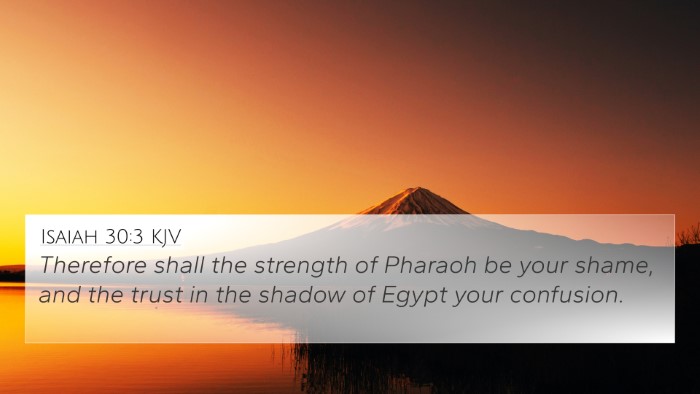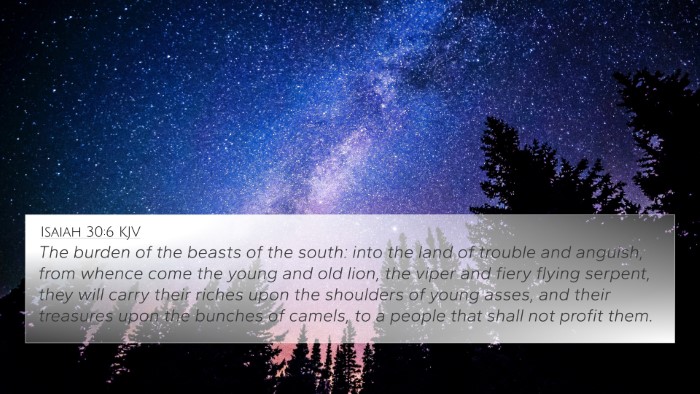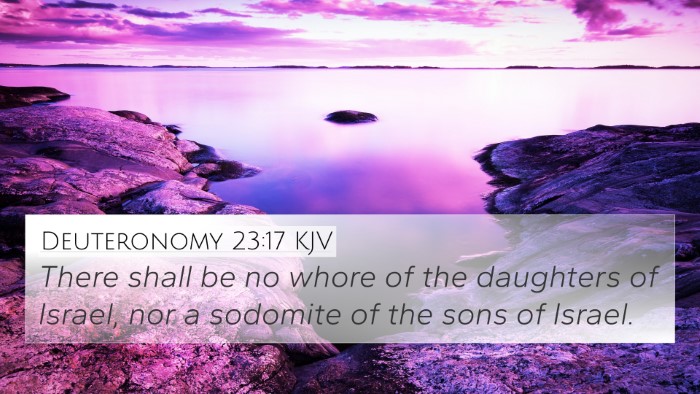Bible Verse Meaning and Insights: Ezekiel 16:33
The verse Ezekiel 16:33 reads: "They give gifts to all who pay attention to them; but you give your gifts to all your lovers, and reward them to come from afar, for your prostitution." (Ezekiel 16:33, NIV)
Summary of Meaning
This verse serves as a profound indictment of Israel's infidelity to God, using the imagery of unfaithful relationships. Here are some summarized insights from recognized public domain commentaries:
- Matthew Henry:
Henry emphasizes that Israel's actions mirror that of a wayward wife who seeks pleasure from many lovers. By giving gifts to her allies, instead of dedicating her devotion to God, Israel has betrayed her covenant relationship with Him.
- Albert Barnes:
Barnes notes the contrast between God's law and Israel's adulterous cities, detailing how Israel rewarded foreign nations rather than relying on God's protection, thus compromising her integrity and holiness as God's chosen people.
- Adam Clarke:
Clarke observes this verse as a stark reminder of the spiritual danger of allowing worldly influences to corrupt one's relationship with God. He highlights the futility of Israel's alliances and the betrayal inherent in her actions.
Cross-References to Ezekiel 16:33
To better understand the significance of Ezekiel 16:33, we can explore its connections with various other Bible verses:
- Hosea 2:5: "For their mother has played the harlot; she who conceived them has behaved shamefully." This emphasizes spiritual unfaithfulness akin to that in Ezekiel.
- Isaiah 1:21: "How the faithful city has become a harlot!" This parallels the theme of unfaithfulness and corruption found in Ezekiel.
- Jeremiah 3:6: "The Lord said to me in the days of King Josiah, 'Have you seen what backsliding Israel has done? She has gone up on every high mountain and under every green tree, and there played the harlot.'" This highlights the continued rebellion of Israel.
- Ezekiel 23:5-6: In this passage, Jerusalem and Samaria are personified as two sisters who engage in harlotry, reflecting a similar betrayal seen in Ezekiel 16.
- Revelation 17:1-2: This New Testament parallel further illustrates the theme of spiritual adultery as it refers to the "great harlot" who makes the nations drunk with her fornications.
- James 4:4: "Adulterers and adulteresses! Do you not know that friendship with the world is enmity with God?" This verse calls attention to the danger of loving worldly things over God.
- Matthew 6:24: "No one can serve two masters." This reflects the central theme of loyalty in relationships, spiritual or otherwise, resonating with Ezekiel's message.
Thematic Analysis
When analyzing Ezekiel 16:33, it’s crucial to explore the overarching themes within the scripture. The passage illustrates:
- Faithfulness vs. Unfaithfulness: The theme manifests vividly as God desires his people's loyalty, contrasting starkly with Israel's disloyalty.
- Consequences of Idolatry: This emphasizes how turning away from God leads to destruction and spiritual emptiness.
- The Nature of God’s Covenant: The insult of breaking a covenant relationship elucidates the seriousness with which God views His promises to His people.
- Spiritual Adultery: An exploration of how engaging with foreign nations (idols) equates to forsaking the one true God.
- Divine Judgment: The context of judgment is prevalent throughout the book of Ezekiel, showcasing the repercussions of betrayal.
Tools for Bible Cross-Referencing
Utilizing cross-references can deepen your understanding and enhance your study of the Scriptures. Here are some tools for effective Bible cross-referencing:
- Bible Concordances: Essential for finding related passages and understanding themes.
- Bible Cross-Reference Guides: These guides help identify interconnections between scriptures for thematic analysis.
- Bible Chain References: This technique links verses that share similar themes or topics, making Bible studies more comprehensive.
Conclusion
In conclusion, Ezekiel 16:33 serves as a poignant warning of the dangers of spiritual infidelity, highlighted by its connections to other biblical texts. Exploring these cross-references not only enhances our understanding of this verse but also illustrates the consistent message of fidelity to God throughout the Bible. By employing tools designed for Bible cross-referencing, individuals can delve deeper into the meanings and applications of scripture.













